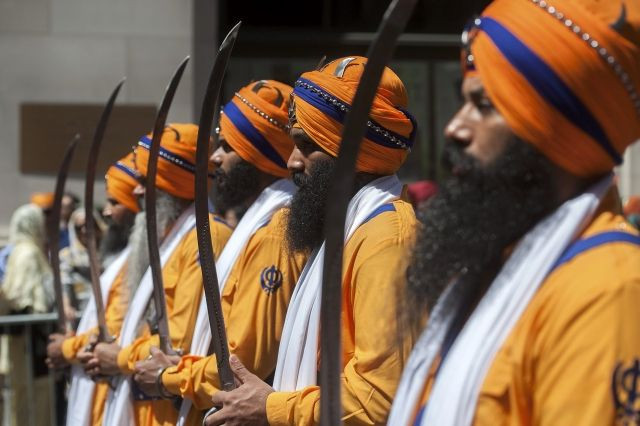Not In My Backyard: Sikhs In Northern England Protest Presence Of Halal Meat Plant Next To Gurdwara

Religious conflicts between Sikhs and Muslims have resurfaced in a place 4,000 miles away from their homeland in the Punjab. In the northern English city of Bradford, in Yorkshire, which has a large South Asian immigrant population, Sikhs have protested plans for the opening of a Muslim-owned halal butcher next to a Gurdwara (a Sikh temple). According to a report in the Bradford Telegraph & Argus newspaper, members of the Guru Gobind Singh Sikh Gurdwara, the largest Sikh temple in the north of England, lost their bid to prevent Pakeezah Group, a Muslim-owned food company, from setting up a wholesale meat plant on Percival Street, near the Gurdwara, in a locale that had formerly served as an auto mechanic shop.
Sikhs, many of whom are vegetarian, objected strenuously to the proposed meat facility, with hundreds of them taking their grievances to Bradford’s City Hall. “Many of our people are strict vegetarians and the notion of meat being so near to the temple is disrespectful and insensitive,” said Dr. Kuldip Bharj, secretary of the Board of Bradford Gurdwaras. “Although we do not eat halal meat, we do not condemn it as repugnant because we do respect other religions. It is really that the smell of meat is very offensive for people who don’t eat it.” Bharj also worried that beef might be processed at the meat plant. "The cow is viewed as a sacred animal and beef is prohibited in Sikhism as it is in Hinduism," she said.
Another prominent local Sikh, barrister Kuljeet Singh, complained that the “purity and sanctity of the Gurdwara is going to be seriously undermined and that will have an effect on the right of Sikhs to worship.” The President of the Gurdwara, Kuldeep Duley, wrote a letter to Bradford Council suggesting that a butcher should be located on an industrial estate, not next to a place of worship. “We are also concerned the wash from the plant will feed rats in the drains, increasing the rodent problem already in the area,” he added.
In an effort to appease the demonstrators, the director of Pakeezah, Tariq Haq, assured them that his factory would not produce any odors or sounds that would disturb Sikh worshippers. Haq also told the protesters he wanted to maintain good relations with Sikhs. “I’ve grown up with Sikhs all my life,” he said. “When I found out there were concerns we went straight to the temple.” Haq also said that: "We will never do anything that might offend our neighbors and many of our customers are Sikhs," adding that "our business is only in chicken, mutton and lamb" (i.e., not beef).
Bradford’s City Council were split on the controversy. Councillors Malcolm Sykes (Conservative), Imran Khan (Labour) and Alan Wainwright (Lab.) opposed the construction of the meat plant so close to a gurdwara. Khan, who is himself Muslim, nonetheless declared that he “would find it very difficult to pray with someone chopping a pig up literally 20 meters away from me. To me, that would be offensive. I think what we need to realize is, for the Sikh community this is the same thing.”
On the other side of the argument stood Councillors Shabir Hussain (Lab.), Keith Dredge (Lab.) and Zameer Shah (Con.). “My beliefs dictate that people can believe what they want and worship what they want and I don’t wish to interfere with that in any way, shape or form,” said Dredge. “But I don’t feel that this would impact on the worship at the Sikh temple.” The Telegraph and Argus reported that Coun. Hussain, the chairman, cast the deciding vote to pass approval of the plan, triggering angry outbursts from local Sikhs.
But it seems no one is happy with the decision. Even Haq of Pakeezah lamented: “the decision [for approval] doesn’t feel like a victory because people are upset. But we want to do everything in our power to make a plant that won’t affect the temple.”
Bradford has one of Britain’s largest Pakistani (Muslim) populations, they account for about one-fifth of the city’s population. The Sikh community in Bradford is much smaller.
© Copyright IBTimes 2024. All rights reserved.




















